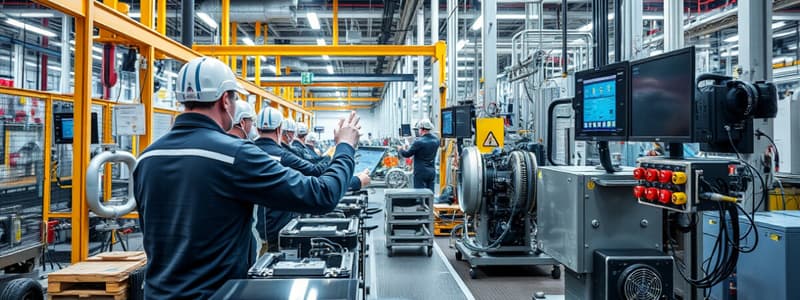Podcast
Questions and Answers
What is the significance of vertical integration in Industry 4.0?
What is the significance of vertical integration in Industry 4.0?
Vertical integration connects processes and business units within an organization, enhancing efficiency and coordination.
How does horizontal integration contribute to the value chain in Industry 4.0?
How does horizontal integration contribute to the value chain in Industry 4.0?
Horizontal integration connects all parts of the supply chain, maximizing the potential value delivered by manufacturing processes.
What are 'smart factories' and how do they relate to Industry 4.0?
What are 'smart factories' and how do they relate to Industry 4.0?
'Smart factories' utilize machines with intelligent capabilities to create products with built-in intelligence, optimizing production.
What challenges do information technology and operational technology pose in the context of Industry 4.0?
What challenges do information technology and operational technology pose in the context of Industry 4.0?
Why is horizontal integration considered to provide the biggest value in manufacturing under Industry 4.0?
Why is horizontal integration considered to provide the biggest value in manufacturing under Industry 4.0?
What are the key components of Industry 4.0?
What are the key components of Industry 4.0?
How does Big Data support the decision-making process in Industry 4.0?
How does Big Data support the decision-making process in Industry 4.0?
Explain the significance of the Internet of Things (IoT) in Industry 4.0.
Explain the significance of the Internet of Things (IoT) in Industry 4.0.
What role does Cyber Security play in the implementation of Industry 4.0?
What role does Cyber Security play in the implementation of Industry 4.0?
Define Additive Manufacturing and its relevance to Industry 4.0.
Define Additive Manufacturing and its relevance to Industry 4.0.
What is the purpose of simulation in the context of Industry 4.0?
What is the purpose of simulation in the context of Industry 4.0?
How does Machine Learning contribute to Industry 4.0?
How does Machine Learning contribute to Industry 4.0?
What barriers might industries face when transitioning to Industry 4.0?
What barriers might industries face when transitioning to Industry 4.0?
What does service orientation mean in the context of Industry 4.0?
What does service orientation mean in the context of Industry 4.0?
Describe the concept of decentralization in Industry 4.0.
Describe the concept of decentralization in Industry 4.0.
What is the role of interoperability in Industry 4.0?
What is the role of interoperability in Industry 4.0?
Define decentralization in the context of Industry 4.0.
Define decentralization in the context of Industry 4.0.
How does the principle of modularity benefit Industry 4.0?
How does the principle of modularity benefit Industry 4.0?
What is meant by real-time capability in Industry 4.0?
What is meant by real-time capability in Industry 4.0?
Explain the importance of service orientation in Industry 4.0.
Explain the importance of service orientation in Industry 4.0.
What technologies enable self-selection of production process routes in Industry 4.0?
What technologies enable self-selection of production process routes in Industry 4.0?
In what way does virtualisation contribute to Industry 4.0?
In what way does virtualisation contribute to Industry 4.0?
Discuss how collaboration across machines plays a role in Industry 4.0.
Discuss how collaboration across machines plays a role in Industry 4.0.
Flashcards are hidden until you start studying
Study Notes
Industry 4.0 - Key Principles
- Interoperability: Enables seamless connections between cyber-physical systems and humans, allowing collaboration across machines and value chains, intersecting with the Industrial Internet of Things.
- Virtualization: Involves creating virtual copies of smart sensor data along with digital twin concepts, aiding in the simulation of real-world processes.
- Decentralization: Empowers systems to make independent decisions based on real-time data without central control.
- Real-Time Capability: Ensures immediate access to data and information for timely decision-making.
- Service Orientation: Focuses on providing services tailored to enhance user experiences and operational efficiencies.
- Modularity: Encourages flexible systems that can adapt and integrate new components as needed.
Integration Strategies
- Vertical Integration: Refers to connecting internal processes and business units within an organization, critically important for effective IT and operational technology alignment.
- Horizontal Integration: Involves linking all elements of the supply chain, offering substantial value addition throughout manufacturing processes.
Smart Factory
- Characterized by intelligent machines capable of producing smart products with built-in processing capabilities that enhance operational performance.
Core Components of Industry 4.0
- Cloud Computing: Facilitates data storage and processing in shared online environments.
- Big Data: Supports improved decision-making by analyzing large datasets for actionable insights.
- Simulation: Offers replicable environments for testing processes and systems.
- Internet of Things (IoT): Connects devices and systems, enabling data exchange and automated responses.
- Additive Manufacturing: Allows for layer-by-layer production, enhancing flexibility and customization.
- Robotics: Integrates advanced robotic technologies for increased efficiency in production.
- Cybersecurity: Essential for protecting sensitive data and systems from cyber threats.
Additional Concepts
- Machine Learning: Improves systems over time through adaptive algorithms.
- Augmented Reality: Enhances user interaction by overlaying digital data onto the physical environment.
- Analytics: Provides tools for interpreting data and guiding strategic decisions.
- Sustainable Value Enhancement: Focuses on creating long-term value while considering environmental impacts and efficiency.
Contextual Challenges
- Industry 4.0 implementation faces barriers such as readiness levels, interoperability issues, infrastructure needs, and cybersecurity readiness.
Studying That Suits You
Use AI to generate personalized quizzes and flashcards to suit your learning preferences.




